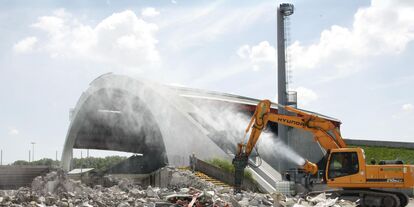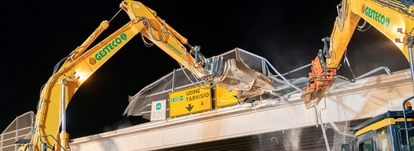Demolition and requalification services for disused areas
The demolition of obsolete buildings or disused structures allows the recovery of previously developed areas, with the aim of requalifying them and avoiding soil consumption.
Our company has gained extensive experience in the demolition sector, with a particular specialization in the demolition and removal of industrial structures, buildings, and plants.
This type of activity requires specific skills and the use of specialized equipment to ensure that the demolition takes place in a safe, efficient, and environmentally sustainable manner.
The strengths of the service
- Complete management of the project from the design phase to the operational phase
- Single point of contact
- Ability to operate in different fields and contexts, including active industrial settings
- Wide range of technologically advanced equipment
- Ability to manage any critical issues due to the finding of various types of waste thanks to the acquired know-how and the ownership of plants and landfills
- Ability to study in the preliminary phase the issues related to the area and the type of intervention, thus reducing the costs and the project timeline
Thanks to the expertise gained over time, we are able to manage a wide range of projects, including the most complex ones. From careful planning to project delivery, we take care of all phases of the process, always aiming for on-time delivery and avoiding additional costs.
Each project is entrusted to highly qualified staff, including heavy equipment operators and specialized technicians. This is our strength in ensuring safety and efficiency during demolitions.
Our company has an internal technical department dedicated to detailed planning of demolition and/or deconstruction interventions, and to the preparation of demolition plans in accordance with Legislative Decree 81/2008.
Thanks to our specialized technicians, we are able to preliminarily analyze each phase of work, starting from the site setup, and we are able to prepare safety operational plans with related graphic documents.
Each site is meticulously studied so as to address any potential issues right from the initial phase, minimizing risks in both safety and environmental aspects. This approach also allows us to resolve any interferences in real time.
The types of demolitions we carry out
Gesteco deals with various types of demolitions:
Industrial demolitions in production and decommissioned contexts
They consist in the dismantling of iron or reinforced concrete sheds, residential, commercial or institutional buildings, such as offices, schools or hospitals, using highly technological machinery, able to crush any type of reinforced concrete material.
The industrial building demolition intervention consists of two phases:
- the so-called "strip-out", which allows the recovery of all equipment, plants, and everything necessary before the actual demolition. In this way, it is possible to remove the "foreign" elements from the construction material that need to be managed differently. Fixtures, visible plants, synthetic or wooden flooring are removed from the building before it is demolished, optimizing the management of the residual materials to then direct them to the most suitable recovery or disposal channels;
- the actual demolition, which is carried out with excavators with hydraulic shears, if necessary with a long arm, and ensures the recovery of ferrous materials once the job is completed. Subsequently, the separation of aggregates from ferrous material takes place.
Demolition of buildings and structures in general
For a variety of reasons, remediations may be necessary, especially when a building or structure is no longer functional or does not meet modern needs. In other cases, intervention is necessary in the presence of structural damage caused by accidents, disasters, or wear and tear, or when planning the construction of a new structure to replace the existing one.
Our interventions are targeted and calibrated based on the size, type of structure involved, and regulations.
Demolition of slabs and underground foundations
They consist of the physical and controlled removal of foundation structures, such as concrete slabs and basements that are located below ground level.
These types of demolitions may be necessary for various reasons, including building renovations, expanding a construction area, or replacing existing foundations.
Chimney demolitions
Chimneys are vertical structures used for the emission of exhaust gases produced by industrial processes or energy production plants. The demolition of a chimney involves the removal of the entire structure or significant parts of it.
These demolitions must be carefully planned to avoid environmental and safety issues, especially if the chimney contains hazardous materials such as asbestos or combustion residues.
Demolition of silos
The silos are vertical or horizontal structures used for the storage of materials such as cereals, pellets, cement, etc.
The demolition of a silo involves the removal of the walls, roof, and internal structures, as well as ensuring the proper management of the materials stored inside the silo during the demolition process.
Demolition of metal structures
It is a process of physical and controlled removal of buildings, bridges, tanks, cranes or other structures built mainly with metal materials, such as steel or aluminum.
These demolitions may be necessary for various reasons, including obsolescence, structural damage, renovations, replacements, or industrial conversions.
The demolition process may involve the use of specialized equipment, such as hydraulic breakers, excavators with demolition arms, or rotary cutters.
"Special" demolitions
They require specific skills and approaches due to their complexity, the unique characteristics of the structures involved, or the need for special techniques to complete the work safely and efficiently. These demolitions can involve a wide range of structures, from historic buildings to critical infrastructures.
The complexity may arise from the presence of hazardous materials, the location of the structure (e.g., in proximity to other buildings or in sensitive environments), the need to safeguard parts of the surrounding structure, or other unique challenges. Special demolitions often require the use of specialized techniques and equipment such as:
- diamond wire cutting;
- the use of controlled explosive charges;
- laser cutting;
- other unconventional methodologies.
Special demolitions place even greater emphasis on safety, for both the personnel involved and the surrounding environment. Minimizing risks is a key priority in these projects.
Demolition with the use of explosives or "implosion demolitions"
It is a specialized technique used to demolish buildings or other structures quickly and in a controlled manner. This method is used when traditional demolitions, using demolition machines or manual excavation, are not practical or effective, for example when it is necessary to remove large buildings in a densely populated area or when maximum precision is required in the structure's fall.
After the explosion, remediation operations are carried out to remove debris and excess materials. Demolition materials are disposed of in accordance with environmental regulations.
Demolitions with explosives can pose significant risks if not carried out correctly. Therefore, they must be conducted by experienced professionals with experience in the field. In addition, it is necessary to obtain the authorizations and necessary approvals from the competent authorities.

Additional services
In addition to the various types of industrial demolitions, our services also include:
Demolitions with initial strip-out on civil and industrial works
Removal of all non-structural elements of a building, for subsequent demolition or for any restoration/conversion works. In particular, the strip-out allows to skeletonize the building in a precise, careful, and systematic way.
The strip-out work is carried out through the removal of fixtures, flooring (including linoleum), external claddings, suspended ceilings, civil or industrial systems and all types of plants.
Logistics, storage, and distribution of materials resulting from demolition
We specialize in road transport services throughout the Friuli Venezia Giulia region: we provide our own logistics platform that includes 4-axle trucks and trailers for both road transport and construction equipment.
Our "turnkey" service
Gesteco studies and develops a customized project for each demolition activity to identify the technique to be applied based on the final purpose.
The goals to be achieved are multiple:
- reduce the execution times of the intervention;
- limit the critical issues and unexpected events during the operation;
- minimize expenses related to the use of machinery, equipment, and labor;
- minimize the discomfort caused by the demolition intervention;
- ensure the safety and protection of all operators involved in the various phases;
- expedite the operations related to recovery and disposal of materials resulting from demolition.
During the necessary inspections, inspections are carried out on the structure to be demolished. Subsequently, the analysis of the context and structure is performed, the choice of the demolition technique to be applied and the estimation of times and costs.
The use of labor and personnel is appropriate to the size of the structures to be demolished, with the adoption of all precautions for a perfect execution in safety, in order to deliver the finished work. Thanks to the use of state-of-the-art machinery and highly qualified personnel, the company is able to propose operational solutions aimed at optimizing costs and procedures, maximizing performance especially in terms of safety.
We recover aggregates to reduce disposal costs
To minimize disposal costs, if the customer requires aggregates such as concrete, brick, and stone resulting from demolition activities, Gesteco has a licensed mobile plant for recovered material known as MPS (Secondary Raw Materials) certified that can be used in construction, for embankments and subbases.
We are constantly increasing the quantities of recycled materials in order to limit landfill disposals and at the same time valorize natural resources on the sustainability front. The ability to manage waste in a conscious manner means implementing various actions to protect not only the environment but also health.
In this regard, we also deal with recovery of aggregates, an operation carried out through particular processing processes. The recycling of materials from demolition also implies the careful disposal of hazardous materials such as, for example, insulation and asbestos, which are properly separated from wood, glass, plastic, and metals. In this way, waste becomes valuable resources.
This waste identification activity is carried out in close collaboration with our in-house chemical laboratory, which, thanks to the presence of highly qualified technicians and the use of cutting-edge equipment, determines whether the "waste" is hazardous or non-hazardous.
Demolition plans
Our Technical Office is responsible for drafting demolition plans in accordance with the D. Lgs 81/2008.
